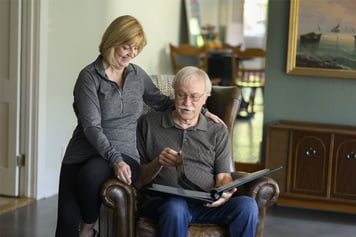Calling Robert Brizzi a gung-ho go-getter might qualify as an understatement. In nine years with Amedisys, the senior account executive in Pensacola, Florida has earned a place on the Circle of Excellence, achieving annual sales among the company’s top home health performers, no fewer than three times.
Over the past four years, Rob, as he’s best known, has grown his business by 30% -- thanks, he readily acknowledges, to clinicians, office staff and, most of all, his Area Vice President Brenda Jahn.
“My number-one goal is to bring patients into our care center,” Rob says, “and to keep those patients from declining or having to go to the hospital.”
What Does an Account Executive Do in Home Health?
- Achieves short and long-term admission and payor-mix goals
- Maintains a complete, up-to-date record of referral sources
- Assists the care center in obtaining required documentation to complete the referral to admission process.
- Masters essentials of the sales model and utilizes the sales process daily
- Develops and maintains client relationships within a competitive marketplace
- Prepares business plans and maintains target lists
How he meets this and other objectives – his modus operandi – comes through in the following chronicle of a recent, representative day on the job. (Note: this interview was conducted before the COVID-19 outbreak. While the essential functions and description remain the same, our team members adhere to all CDC and safety guidelines when interacting with physicians and facilities).
7:00 a.m. Maps out his schedule and his route. “Planning the day – and each call – is important,” Rob says. “I emphasize this point when mentoring new account executives. Even if you know our programs and have a terrific personality, you’ll be more efficient and productive if you know how to make the best use of your time.”
8:00 a.m. Calls a contact at an assisted living facility (ALF), asks who’s recently moved in or out and who’s in the hospital or in rehab. “You have to ask good questions,” Rob says -- “discovery questions,” as a lawyer would ask. The more specific the questions, the more likely to draw someone out and yield a useful answer. So rather than ask, “Does anyone there need our help,” he’ll ask, “Has anyone there recently fallen?” The client is then more likely to answer, “Yes.”
[action 1]
8:30 a.m. Drives to skilled nursing facility (SNF) to pick up resumption of care orders and help transition a patient. “We track patients on our services who are being admitted to or discharged from an institution,” Rob says. “This field is highly competitive. Sometimes we have to remind patients about us. Then they’ll say to a social worker, ‘I’d like to leave here with Amedisys.’”
9:00 a.m. Meets a primary care physician at his office, discusses the Amedisys Heart Failure Program, delivers an update on patients the prescribing M.D. referred to Amedisys recently.
10:00 a.m. Visits another ALF, negotiates a possible agreement with a rehab provider. Again asks about move-ins and other transitions. The key in such scenarios, Rob says, is to get people talking and gather information that will bring value to patients and providers alike. “Most people want to talk,” he explains. “You have to show you’re interested in what they have to say. And to imagine what’s important to the other person. You should always do less than 30% of the talking.”
11:00 a.m. Stops off at another ALF, collects a handy list of current residents. “It’s important to get in as many sales calls before 10:00 a.m.,” Rob says. “After that, referral sources usually start calling you to pick up same-day discharges and other orders.”
1:00-3:00 p.m. Drops in at SNF, meets with patient, calls primary-care doctor to follow up. Lays the groundwork for three referrals that will come through the next week. Again, engages in the discovery process – asking who’s there, who’s just come in, who’s leaving? – to identify leads for patients who could benefit from services through Amedisys. Documents the sales call, as he does all others. “The best practice,” he points out, “is to enter each sales call immediately following that call.”
3:30 p.m. Drops by another ALF, follows up on two leads, asks administrator to reach out to M.D. who has yet to respond to his requests for information. Asks, “Are any of your residents having difficulty swallowing while eating?” “Yes,” a care coordinator answers, “so-and-so is drooling.” Answers Rob: “Oh, he might be candidate for speech therapy.”
4:00 p.m. Stops at physician office, speaks to certified case manager, asks about recent transitions, new patients. “You have to establish a customer service relationship with everyone,” Rob says. “Otherwise you’re out of sight, out of mind.”
4:30 p.m. Visits another SNF. Transitions a patient who was a last-minute discharge, asks about upcoming discharges, touts the Amedisys Heart Failure Program.
“Communicate with your leader and your care centers,” Rob advises. “I speak to my AVP every day to ask for feedback and share wins and issues. Adopt a great attitude despite the day-to-day challenges. Be authentic because trying to be someone else is usually obvious. And close on every call. Even an awkward close is 100% better than no close at all.”
Infinite adaptability comes in handy, too. “Some days my schedule is all laid out and then a nursing home calls with an urgent need to pick up an order or transition a patient,” he says. “So I stop whatever I’m doing to drive there. It helps that I was a wrestler in high school and college. I went into every match planning to try this move or that move and then the opponent would surprise me and I would have to adjust. Sales is the same.”
Also essential is utmost reliability. “When I say I’m going to do something, I follow through on it,” Rob says. Clients can call me at home after hours. That was the case even during my recent honeymoon. My bride asked me why. I said, ‘Because it’s taken me years to build this trust. And trust is something you have to keep earning.”





